pandemics
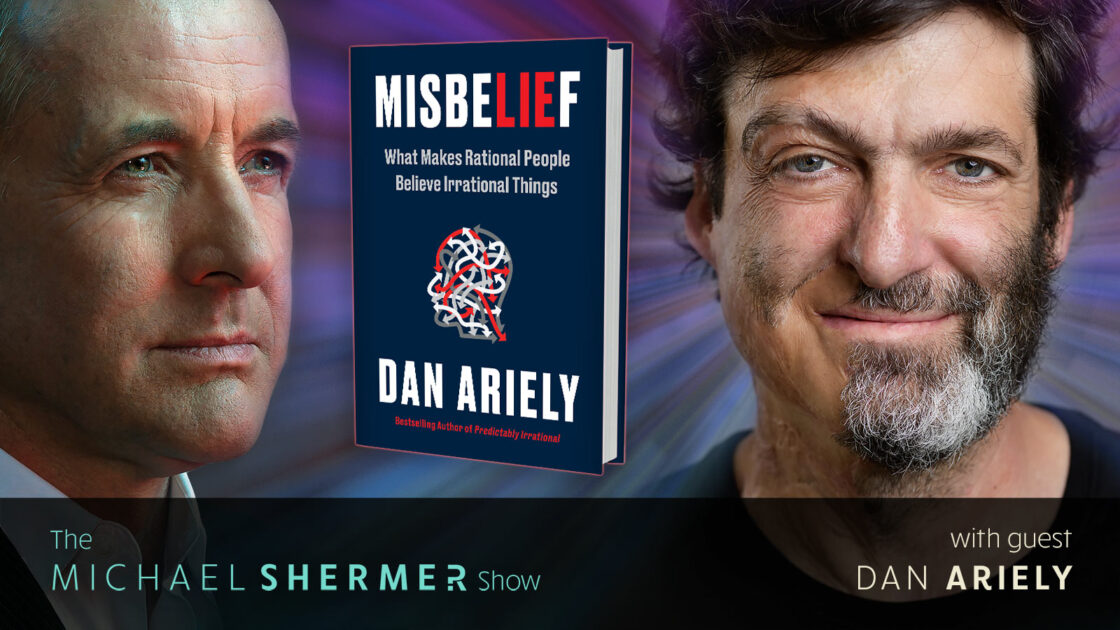
Shermer and Ariely discuss: What is disinformation and what should we do about it? • How do we know what is true and what to believe? • virtue signaling one’s tribe as a misbelief factor • the role of complex stories in misbelief • emotions, personality, temperament, trust, politics, and social aspects of belief and misbelief • the funnel of belief • social proof and the influence of others on our beliefs • a COVID-23 pandemic • social media companies…
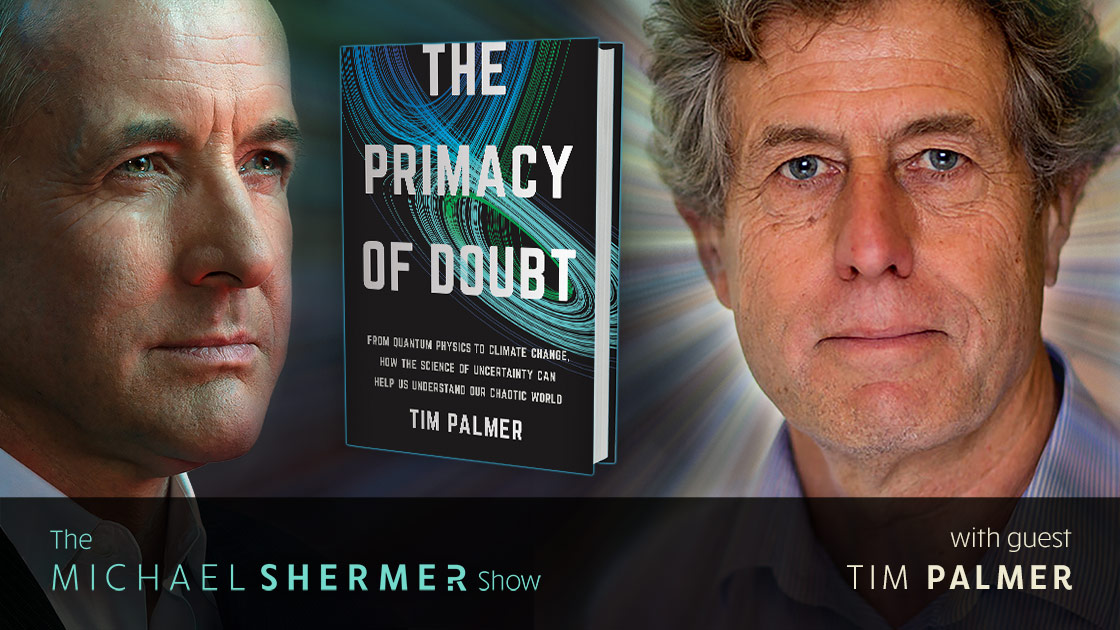
Shermer and Palmer discuss: doubt and skepticism • when doubt slides into denial • uncertainty as a measurement problem vs. inherent in natural systems • contingency and necessity, randomness and law • the butterfly effect • the geometry of chaos • quantum uncertainty • weather forecasting • climate change • pandemics • economic recessions • human decision making and creativity • free will • consciousness, and God.

In episode 186 of Michael Shermer’s podcast, Michael speaks with Nobel Prize-winning pioneer in environmental economics, Dr. Nordhaus, about his book The Spirit of Green: The Economics of Collisions and Contagions in a Crowded World in which he explains how and why “green thinking” could cure many of the world’s most serious problems — from global warming to pandemics.
In episode 186 of Michael Shermer’s podcast, Michael speaks with Nobel Prize-winning pioneer in environmental economics, Dr. Nordhaus, about his book The Spirit of Green: The Economics of Collisions and Contagions in a Crowded World in which he explains how and why “green thinking” could cure many of the world’s most serious problems — from global warming to pandemics.

In episode 179 of Michael Shermer’s podcast, Michael Shermer speaks with one of the world’s most renowned historians, Niall Ferguson, who explains why our ever more bureaucratic and complex systems are making us worse, not better, at handling disasters.
In episode 179 of Michael Shermer’s podcast, Michael Shermer speaks with one of the world’s most renowned historians, Niall Ferguson, who explains why our ever more bureaucratic and complex systems are making us worse, not better, at handling disasters.

Raymond Barglow and Margret Schaefer discuss the anti-vaccination movement in the age of COVID-19.
In this cover story article (written in October 2020) for Skeptic magazine 25.4 (December 2020), Daniel Loxton considers the unsavory origins and rising threat of the QAnon conspiracy theory. Written prior to the deadly QAnon-led occupation of the Capitol Building in Washington, DC on January 6, 2021, this analysis exposes the conspiracy theory as baseless, unoriginal, and harmful for believers and society at large.

In this cover story article (written in October 2020) for Skeptic magazine 25.4 (December 2020), Daniel Loxton considers the unsavory origins and rising threat of the QAnon conspiracy theory. Written prior to the deadly QAnon-led occupation of the Capitol Building in Washington, DC on January 6, 2021, this analysis exposes the conspiracy theory as baseless, unoriginal, and harmful for believers and society at large.
In Science Salon 149, the last of 2020, Dr. Michael Shermer reflects on the many issues we have witnessed this year: Black Live Matter, class conflicts, income inequality, lack of education, anti-Semitism, far-left illiberalism, far-right xenophobia and bigotry, and religious indoctrination. He then reads an expanded version of his essay The After Time: The Future of Civilization After COVID-19.

In Science Salon 149, the last of 2020, Dr. Michael Shermer reflects on the many issues we have witnessed this year: Black Live Matter, class conflicts, income inequality, lack of education, anti-Semitism, far-left illiberalism, far-right xenophobia and bigotry, and religious indoctrination. He then reads an expanded version of his essay The After Time: The Future of Civilization After COVID-19.
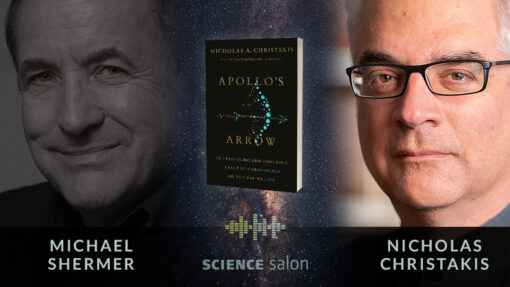
Shermer and Christakis discuss: the replication crisis in social science and medicine • determining causality: how we know smoking causes cancer and HIV causes AIDS, but vaccines do not cause autism and cell phones do not cause cancer • randomized controlled trials and why they can’t be done to answer many medical questions • natural experiments and the comparative method of testing hypotheses (e.g., comparing different countries differing responses to Covid-19) • the hindsight bias and the curse of knowledge…
Dr. Michael Shermer considers the pitfalls of projecting the consequences of the pandemic for our future (the availability heuristic, the negativity bias, the difficulties of superforecasting, and the contingent nature of history). PLUS: In Science Salon # 131, Michael Shermer speaks with Stuart Ritchie his book Science Fictions: How Fraud, Bias, Negligence, and Hype Undermine the Search for Truth.
Right now, we are all confronting one of humanity’s scariest enemies: epidemic disease. Are we brave enough to face this horror? You bet we are! Download Junior Skeptic 76 for free: Pandemics Throughout History—How Mistakes, Fakes, and Missing Facts Make Epidemics Worse. PLUS: Dr. Michael Shermer gives a remote lecture on free speech & censorship.
In Science Salon # 125 Michael Shermer speaks Bjorn Lomborg about his new book False Alarm: How Climate Change Panic Costs Us Trillions, Hurts the Poor, and Fails to Fix the Planet.
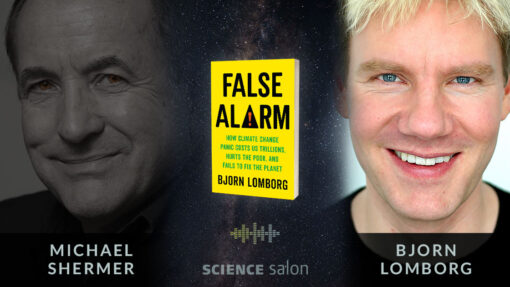
Bjorn Lomborg argues that climate change is real, but it’s not the apocalyptic threat that we’ve been told it is. Projections of Earth’s imminent demise are based on bad science and even worse economics, he claims. Lomborg attempts to convince us that everything we think about climate change is wrong — and points the way toward making the world a vastly better, if slightly warmer, place for us all.
In Science Salon # 122 Michael Shermer speaks with Walter Scheidel as he recounts the gripping story of how the end of the Roman Empire was the beginning of the modern world. PLUS, Harriet Hall, M.D. sets the record straight on wearing face masks during the COVID-19 Pandemic.

Masks have been proven to reduce the spread of COVID-19, but instead of believing the evidence and following public health guidelines, many people have turned mask wearing into a political statement. They are refusing to wear masks for reasons that are laughable. Rejecting masks is selfish: it means they don’t care if other people get sick and die. Here’s what Harriet Hall, M.D., The SkepDoc, has to say about it.
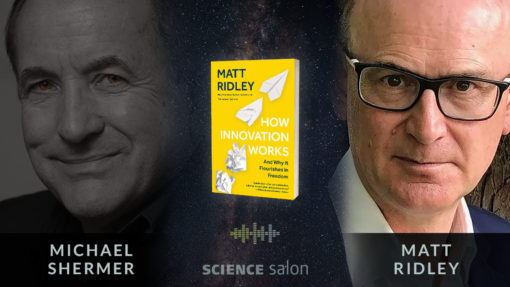
Innovation is the main event of the modern age, the reason we experience both dramatic improvements in our living standards and unsettling changes in our society. Matt Ridley argues that we need to think about innovation as an incremental, bottom-up, fortuitous process that happens to society as a direct result of the human habit of exchange, rather than an orderly, top-down process developing according to a plan.
In Science Salon # 117, Michael Shermer speaks with Matt Ridley about his book How Innovation Works: and Why It Flourishes in Freedom.
NEXT →



















